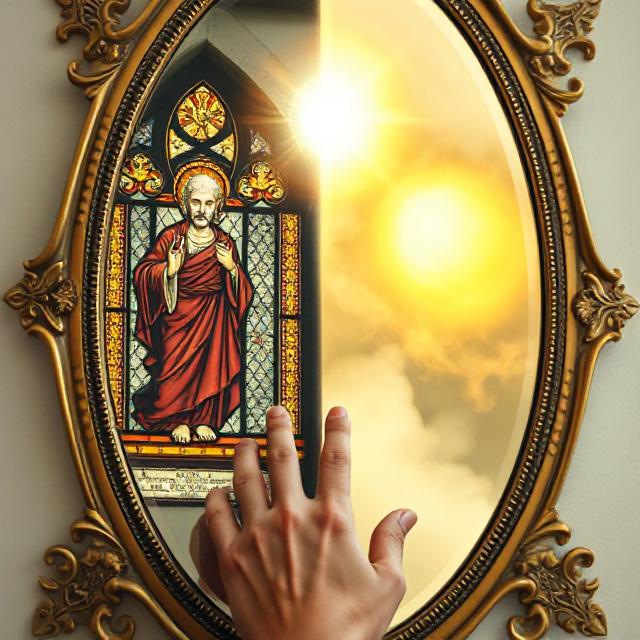
Table of Contents
God in Christianity vs Brahman in Hinduism
God in Christianity vs Brahman in Hinduism: Divine Difference or Shared Mystery?
At the heart of the world’s major religions lies a deep yearning to understand the Divine. In Christianity, this takes the form of a personal, loving God who created and governs the universe. In Hinduism, the ultimate reality is called Brahman, an impersonal, all-encompassing source of all that exists. This leads us to a profound question: How different are these conceptions of the divine?
By comparing God in Christianity vs Brahman in Hinduism, we open a window into not only two of the world’s most enduring spiritual traditions but into two radically distinct ways of understanding ultimate reality, the self, and salvation.
I. God in Christianity: A Personal, Triune Creator
1. Theistic Monotheism
Christianity, rooted in Judaism, affirms monotheism: the belief in a single, omnipotent, omniscient, and omnibenevolent God.
- God is a person, not a force.
- God has a will, speaks through prophets, and acts in history.
- Creation is distinct from God but completely dependent on Him.
2. The Trinity
Christianity’s unique doctrine is that God is triune—one God in three persons: the Father, the Son (Jesus Christ), and the Holy Spirit.
- This structure reflects relationship within God Himself.
- It emphasizes God’s personal nature—God relates to humans as a Father, Savior, and inner spiritual guide.
3. God’s Immanence and Transcendence
- Transcendent: God exists beyond time and space.
- Immanent: God enters into creation through Jesus, and dwells in believers through the Holy Spirit.
4. Salvation and Relationship
- Humanity is seen as separate from God due to sin.
- Salvation involves restoring a relationship with God through faith in Jesus.
- God is not just a cosmic principle but a loving Father who seeks communion with His creation.
II. Brahman in Hinduism: The Infinite Ground of Being
1. Monism and Pantheism
While Hinduism includes many gods (polytheism), its highest philosophical tradition (Advaita Vedanta) points to Brahman as the non-dual ultimate reality.
- Brahman is not a person but the pure existence underlying all.
- Everything—gods, humans, cosmos—is a manifestation of Brahman.
- Brahman is formless, changeless, eternal, and beyond attributes (nirguna).
2. Saguna vs Nirguna Brahman
- Nirguna Brahman: Without form or qualities; pure, impersonal awareness.
- Saguna Brahman: Brahman with form; can be worshiped as deities (e.g., Vishnu, Shiva, Devi).
This allows for both personal and impersonal worship within Hinduism, unlike Christianity’s strictly personal deity.
3. Atman and Brahman
- The Atman (individual soul) is identical to Brahman in Advaita Vedanta.
- The spiritual journey involves realizing one’s identity with Brahman—a process called moksha (liberation).
- Liberation is not relationship with the divine but dissolution into the divine.
III. Key Differences: Personhood vs Principle
| Feature | Christianity (God) | Hinduism (Brahman) |
|---|---|---|
| Nature | Personal, relational | Impersonal, abstract |
| Relationship to World | Creator distinct from creation | World as manifestation of Brahman |
| Goal of Salvation | Union through relationship | Dissolution of ego into oneness |
| Experience of Divine | Through prayer, worship, and grace | Through meditation, realization |
| Ethical Role | God commands morality | Brahman is beyond good and evil |
IV. Similarities and Bridges
Despite their profound differences, these traditions also share some commonalities:
1. Mystical Traditions
- Christian mystics like Meister Eckhart or St. John of the Cross speak of God as beyond concepts, echoing Hindu ideas of the ineffable Brahman.
- Hindu Bhakti movements express love for personal deities, resembling Christian devotion.
2. Transcendence of Language
Both traditions ultimately describe God/Brahman as beyond comprehension:
“If you understand, it is not God.” – St. Augustine
“Neti Neti” (Not this, not this) – Upanishads
3. Moral Transformation
- Christianity emphasizes repentance and grace.
- Hinduism emphasizes karma and self-discipline.
Yet both seek to transform the soul through spiritual practice and ethical living.
V. Philosophical Implications
1. Ontology: Being vs Beyond Being
- In Christianity, God is the supreme being.
- In Hinduism, Brahman is beyond being, not one being among many but the ground of all being.
2. Epistemology: Knowing God vs Realizing Brahman
- Christianity emphasizes revelation (Scripture, Jesus) to know God.
- Hinduism emphasizes inner realization through meditation and philosophical inquiry.
3. Soteriology: Rescue vs Awakening
- Christianity focuses on rescue from sin and death.
- Hinduism focuses on awakening from illusion (maya) and realizing the self as divine.
VI. Contemporary Relevance
Why does comparing God in Christianity vs Brahman in Hinduism matter today?
- In an age of globalization, interreligious dialogue helps build mutual understanding.
- Spiritual seekers often blend Eastern and Western ideas—understanding distinctions is crucial to avoid confusion.
- Ethics, ecology, and human rights debates can benefit from both views: the dignity of the person and the sacredness of all existence.
VII. Conclusion: One Truth or Many Paths?
The question of God in Christianity vs Brahman in Hinduism invites us to explore the mystery of the divine from radically different perspectives—personal vs impersonal, creator vs essence, relationship vs realization.
Rather than seeing one as right and the other as wrong, we might ask: What is each tradition trying to illuminate? Perhaps the divine is so vast that it can be meaningfully approached both as the loving Father and the formless Absolute.
As the Rig Veda says, “Truth is one; sages call it by many names.”
And perhaps, as St. Paul said, “Now we see through a glass darkly.”